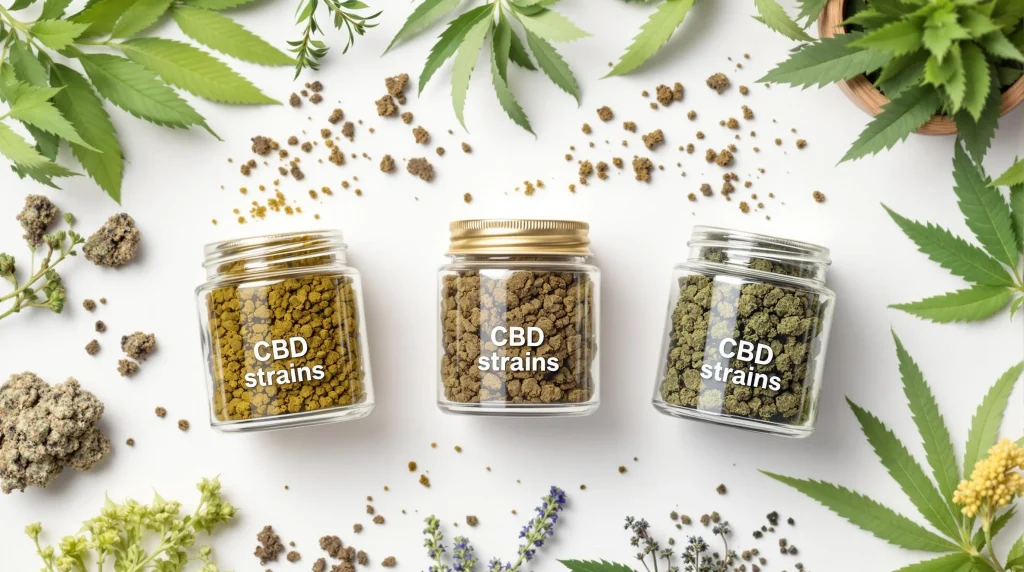Combining ibuprofen and CBD is a question many people have when looking for effective ways to manage pain, inflammation, and discomfort. With CBD’s growing popularity as a natural remedy and ibuprofen’s long-standing reputation as a reliable over-the-counter medication, many wonder how these two substances interact. This guide explores everything you need to know about using them together safely and effectively.
Basics of CBD and Ibuprofen
What is CBD, and How Does It Work in the Body?
CBD, or cannabidiol, is one of over 100 compounds found in the cannabis plant. Unlike THC, it does not produce psychoactive effects, meaning it won’t make you feel “high.” Instead, CBD interacts with the body’s endocannabinoid system (ECS), a network of receptors that plays a role in regulating processes like pain perception, inflammation, mood, and immune response.
By binding to receptors in the ECS, CBD may help modulate pain and reduce inflammation. It is often praised for its versatility, providing relief without the side effects commonly associated with pharmaceutical medications. This makes CBD an appealing option for individuals seeking natural ways to manage chronic or acute discomfort.
How Ibuprofen Works as an Anti-Inflammatory and Pain Reliever
Ibuprofen is a widely used nonsteroidal anti-inflammatory drug (NSAID) that blocks the production of prostaglandins, chemical compounds responsible for inflammation and pain. It does this by inhibiting enzymes called COX-1 and COX-2. These enzymes play a significant role in the body’s inflammatory response.
As an over-the-counter medication, ibuprofen is accessible and effective for addressing a variety of issues, including headaches, muscle soreness, arthritis, and fever. However, frequent or prolonged use can lead to potential side effects, such as gastrointestinal irritation, kidney strain, and liver issues. These risks drive many people to explore alternative or complementary treatments like CBD.
Why People Consider Combining CBD with Ibuprofen
Common Reasons for Using CBD with Ibuprofen Together
Many individuals explore combining CBD with ibuprofen to achieve more comprehensive pain relief. Conditions such as arthritis, back pain, migraines, and sports injuries often require a multi-pronged approach. By targeting different pathways in the body, CBD with ibuprofen may work synergistically to alleviate discomfort.
CBD’s ability to reduce inflammation complements ibuprofen’s fast-acting pain relief. This combination appeals to those who want to address the root cause of their symptoms while experiencing immediate relief. Additionally, individuals who prefer natural remedies often turn to CBD as a way to enhance the effects of traditional medications without increasing their dosage.
Potential Benefits of Combining These Substances
Pairing CBD with ibuprofen can offer several advantages. For one, CBD may help mitigate some of the side effects associated with NSAIDs. For instance, CBD’s anti-inflammatory properties could reduce the need for higher doses of ibuprofen, potentially lowering the risk of gastrointestinal irritation or kidney issues.
Additionally, combining these two substances may provide more targeted relief for chronic conditions. For example, CBD can support long-term inflammation management, while ibuprofen addresses acute flare-ups. Together, they create a balanced approach to pain relief that supports both immediate and ongoing needs.
How CBD with Ibuprofen Interact
Potential Drug Interactions Between CBD with Ibuprofen
CBD with ibuprofen are both metabolized in the liver, specifically through the cytochrome P450 enzyme system. This shared pathway means that CBD has the potential to alter how ibuprofen is processed by the body. By inhibiting the P450 enzymes, CBD can slow the breakdown of ibuprofen, leading to higher concentrations in the bloodstream.
While this interaction is not inherently dangerous, it can increase the risk of side effects such as stomach upset, dizziness, or kidney strain. For this reason, it is essential to monitor how your body reacts when taking both substances and adjust dosages as needed.
Is It Safe to Take CBD with Ibuprofen Together?
For most people, taking CBD with ibuprofen together is considered safe, provided it is done in moderation and with proper guidance. However, individual factors such as metabolism, overall health, and the presence of other medications can influence how your body responds.
To minimize risks, start with low doses of both CBD and ibuprofen. Monitor your symptoms and watch for any adverse reactions, such as increased drowsiness or gastrointestinal discomfort. Consulting a healthcare provider is highly recommended, especially if you plan to use this combination regularly or at higher doses.
Factors That Influence Safety and Efficacy
The effectiveness and safety of combining CBD with ibuprofen depend on several factors, including:
- Timing: Spacing out doses may reduce the likelihood of interactions.
- Dosage: Lower doses are less likely to cause side effects while still providing relief.
- Type of CBD: Full-spectrum CBD, which contains trace amounts of other cannabinoids, may have a different impact compared to CBD isolate.
Knowing these factors can help you make informed decisions about using CBD with ibuprofen together.

Benefits of Combining CBD with Ibuprofen
Enhanced Pain Relief for Chronic Conditions
CBD with ibuprofen can work together to provide a more comprehensive approach to pain relief. Chronic conditions such as arthritis, fibromyalgia, and back pain often require a combination of treatments for effective management. CBD’s anti-inflammatory properties target the underlying cause of pain, while ibuprofen offers fast-acting symptom relief.
For example, arthritis sufferers may find that CBD helps reduce joint inflammation over time, while ibuprofen addresses acute flare-ups. This complementary effect can provide both immediate comfort and long-term improvements.
Anti-Inflammatory Effects of CBD with Ibuprofen
Both CBD and ibuprofen are known for their anti-inflammatory properties, but they work through different mechanisms. Ibuprofen inhibits COX enzymes to reduce inflammation, while CBD interacts with the endocannabinoid system to modulate the body’s immune response. When used together, these substances can amplify each other’s effects.
This synergy is particularly beneficial for conditions involving significant inflammation, such as sports injuries, autoimmune disorders, or recovery from surgery. By addressing inflammation from multiple angles, the combination may enhance recovery and improve overall well-being.
Risks and Considerations When Taking CBD with Ibuprofen
Possible Side Effects of Combining CBD with Ibuprofen
While the combination of CBD with ibuprofen is generally safe for most people, there are potential side effects to be aware of. These may include:
- Increased Risk of Gastrointestinal Issues: Ibuprofen can irritate the stomach lining, and high concentrations in the bloodstream, potentially influenced by CBD, may exacerbate this effect.
- Drowsiness or Fatigue: CBD’s calming effects, combined with ibuprofen, may lead to feelings of drowsiness, especially at higher doses.
- Kidney Strain: Prolonged use of NSAIDs like ibuprofen can stress the kidneys, and combining with CBD may require careful monitoring to avoid compounding effects.
It’s crucial to monitor your body’s response when using both substances and consult a healthcare provider if you experience persistent or severe side effects.
Dosage Guidelines and Precautions
To minimize risks and maximize benefits, follow these dosage tips:
- Start Low and Go Slow: Begin with the lowest effective doses of both CBD with ibuprofen, especially if you’re new to either substance.
- Space Out Doses: Taking CBD and ibuprofen at different times can reduce the likelihood of interactions in the liver.
- Consult a Professional: Speak with a healthcare provider to tailor your dosage based on your medical history and specific needs.
Pay close attention to how your body reacts and adjust dosages as necessary. Personalized care is key to ensuring safety and effectiveness.
Alternatives to Combining CBD with Ibuprofen
Using CBD Alone for Pain Relief
For some individuals, CBD alone may provide sufficient relief without the need for ibuprofen. CBD’s natural ability to reduce inflammation and pain makes it a viable alternative for managing mild to moderate discomfort. It’s particularly effective for:
- Chronic pain conditions, such as neuropathy or arthritis
- Stress-induced headaches and muscle tension
- Post-exercise recovery
By focusing on CBD, you may avoid the potential risks associated with long-term NSAID use while still achieving meaningful relief.
Exploring Other Natural Pain Relief Options
In addition to CBD, there are other natural remedies that can complement or replace ibuprofen. These include:
- Turmeric: Contains curcumin, a compound with strong anti-inflammatory properties.
- Omega-3 Fatty Acids: Found in fish oil, these help reduce inflammation throughout the body.
- Acupuncture or Massage: Non-pharmaceutical methods for relieving pain and promoting relaxation.
Combining CBD with these natural alternatives can create a holistic approach to pain management, reducing reliance on pharmaceutical options.
Best CBD Strains for Pain Relief
When considering using CBD for pain relief alongside ibuprofen or as an alternative, choosing the right strain can make a significant difference. Here are three CBD strains known for their therapeutic properties:
Harlequin
Harlequin is a high-CBD strain with a 5:2 CBD to THC ratio, making it an excellent choice for managing pain without significant psychoactive effects. Its earthy, sweet aroma complements its calming and soothing properties, ideal for chronic pain and inflammation.
ACDC
Solomatic CBD Auto is a popular strain for those seeking a non-intoxicating option with high CBD levels and minimal THC content. This Solomatic CBD Auto strain is easy to grow and offers calming effects, making it suitable for managing conditions like inflammation and mild to moderate pain.
Charlotte’s Web
Charlotte’s Web is a world-famous CBD strain with minimal THC content, making it non-intoxicating. It is widely used for its potent anti-inflammatory and pain-relieving properties, especially for conditions like fibromyalgia and migraines.
CBD Kush
CBD Kush is a soothing CBD-rich strain with very low THC levels, offering calming effects without intoxication. It is valued for its relaxing body sensation and gentle mental clarity, making it a popular choice for easing pain, reducing inflammation, and relieving everyday stress while remaining fully functional.
These strains can enhance your pain management routine when used responsibly, either alone or in conjunction with other treatments like ibuprofen.

FAQs About Combining CBD with Ibuprofen
Can CBD Replace Ibuprofen for Pain Management?
Yes, for some individuals, CBD alone may provide sufficient pain relief, especially for mild to moderate discomfort. However, for acute or severe pain, combining CBD with ibuprofen may be more effective. It’s essential to assess your specific needs and consult a healthcare provider for personalized guidance.
Are There Long-Term Risks of Using CBD with Ibuprofen Together?
Current research suggests that occasional use of CBD with ibuprofen together is generally safe for most people. However, long-term or high-dose use of ibuprofen can lead to gastrointestinal and kidney issues. Monitoring your body’s response and seeking medical advice are crucial when using this combination over an extended period.
How Long Should I Wait Between Taking CBD and Ibuprofen?
Spacing doses by 2 to 4 hours is recommended to minimize potential interactions in the liver’s metabolic pathways. This allows each substance to be processed more effectively, reducing the risk of side effects.
Can I Use CBD and Ibuprofen for Post-Workout Recovery?
Yes, the combination can be highly effective for managing post-workout soreness and inflammation. CBD helps reduce inflammation and promotes relaxation, while ibuprofen provides immediate pain relief for acute muscle discomfort.
What Should I Do If I Experience Side Effects?
If you notice any adverse reactions, such as stomach pain, dizziness, or fatigue, stop using the combination and consult a healthcare provider. Adjusting the dosage or switching to alternative pain relief methods may be necessary.




